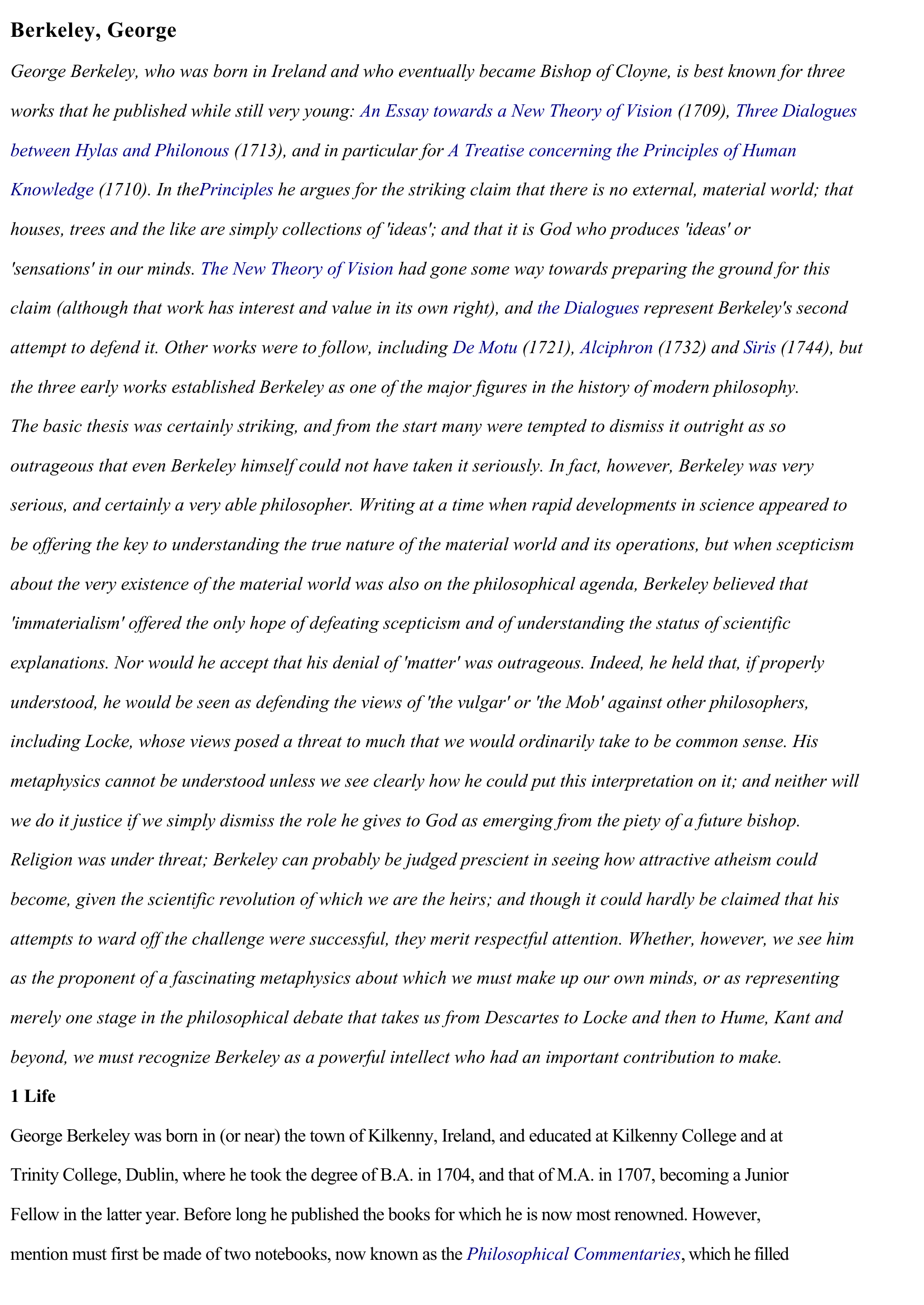Berkeley, George
Extrait du document
«
Berkeley, George
George Berkeley, who was born in Ireland and who eventually became Bishop of Cloyne, is best known for three
works that he published while still very young: An Essay towards a New Theory of Vision (1709), Three Dialogues
between Hylas and Philonous (1713), and in particular for A Treatise concerning the Principles of Human
Knowledge (1710).
In thePrinciples he argues for the striking claim that there is no external, material world; that
houses, trees and the like are simply collections of 'ideas'; and that it is God who produces 'ideas' or
'sensations' in our minds.
The New Theory of Vision had gone some way towards preparing the ground for this
claim (although that work has interest and value in its own right), and the Dialogues represent Berkeley's second
attempt to defend it.
Other works were to follow, including De Motu (1721), Alciphron (1732) and Siris (1744), but
the three early works established Berkeley as one of the major figures in the history of modern philosophy.
The basic thesis was certainly striking, and from the start many were tempted to dismiss it outright as so
outrageous that even Berkeley himself could not have taken it seriously.
In fact, however, Berkeley was very
serious, and certainly a very able philosopher.
Writing at a time when rapid developments in science appeared to
be offering the key to understanding the true nature of the material world and its operations, but when scepticism
about the very existence of the material world was also on the philosophical agenda, Berkeley believed that
'immaterialism' offered the only hope of defeating scepticism and of understanding the status of scientific
explanations.
Nor would he accept that his denial of 'matter' was outrageous.
Indeed, he held that, if properly
understood, he would be seen as defending the views of 'the vulgar' or 'the Mob' against other philosophers,
including Locke, whose views posed a threat to much that we would ordinarily take to be common sense.
His
metaphysics cannot be understood unless we see clearly how he could put this interpretation on it; and neither will
we do it justice if we simply dismiss the role he gives to God as emerging from the piety of a future bishop.
Religion was under threat; Berkeley can probably be judged prescient in seeing how attractive atheism could
become, given the scientific revolution of which we are the heirs; and though it could hardly be claimed that his
attempts to ward off the challenge were successful, they merit respectful attention.
Whether, however, we see him
as the proponent of a fascinating metaphysics about which we must make up our own minds, or as representing
merely one stage in the philosophical debate that takes us from Descartes to Locke and then to Hume, Kant and
beyond, we must recognize Berkeley as a powerful intellect who had an important contribution to make.
1 Life
George Berkeley was born in (or near) the town of Kilkenny, Ireland, and educated at Kilkenny College and at
Trinity College, Dublin, where he took the degree of B.A.
in 1704, and that of M.A.
in 1707, becoming a Junior
Fellow in the latter year.
Before long he published the books for which he is now most renowned.
However,
mention must first be made of two notebooks, now known as the Philosophical Commentaries, which he filled.
»
↓↓↓ APERÇU DU DOCUMENT ↓↓↓
Liens utiles
- , [L'homme nie le naturel] George BATAILLE
- BERKELEY
- Berkeley, « Être, c'est être perçu »
- Berkeley: La matière existe-t-elle ?
- Vous développerez, autant que possible à l'aide de souvenirs personnels et précis, ces lignes de George Sand : « Oh ! Quel est celui de nous qui ne se rappelle avec amour les premiers ouvrages qu'il a dévorés ou savourés ? La couverture d'un bouquin poud

































